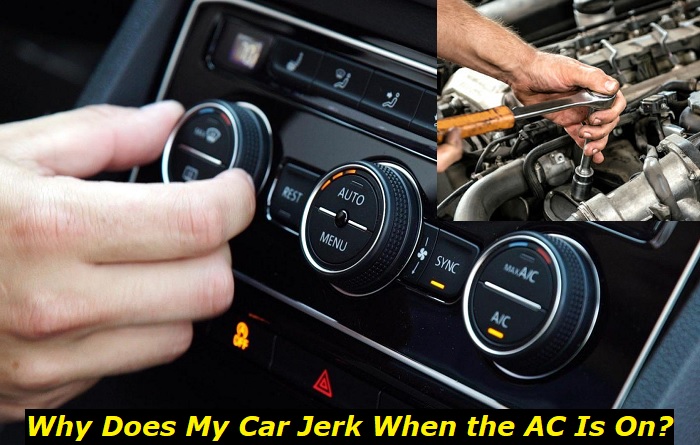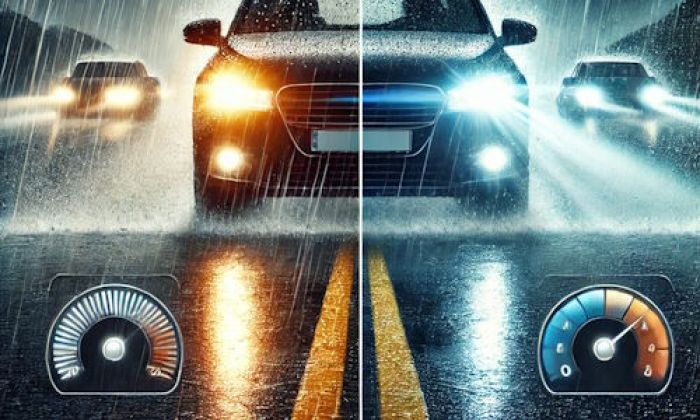Your car should work smoothly under almost any conditions. And when it jerks just because you turned on the AC, there is nothing good in this situation. It shouldn't be like that and the problem has to be addressed. Only in some vehicles with small and weak engines, this situation may be considered more or less normal.
If your vehicle jerks when the AC is on, you should check the AC, the throttle body, and the alternator. It's not hard to understand which unit is in charge of jerking. You will just need to focus on the symptoms and analyze the behavior of your vehicle.

Why is understanding the symptoms important?
If you want to locate the problem on your own, you will need to focus on the symptoms. Otherwise, you should just take our vehicle in for the inspection and you can stop reading here. If you still want to know some DIY repair methods, let's look at the symptoms.
Here's what they can mean:
- if the jerking and shuddering only happen when your car is stopped, the idle speed may be too low, you should check the throttle body and especially the idle air control valve;
- if the jerking happens when you accelerate, your vehicle may lack power, some problems with the engine are possible like misfiring, bad spark plugs or coils, poor fuel injection;
- if the jerking is random and intermittent, you should pay attention to the AC compressor - it may create too much load for the engine;
- if you also hear some bad sounds when the AC is running, it's important to locate the source of those sounds first.
So, understanding the symptoms will help you narrow down the list of issues that can trigger the problem of car jerking. This will help you spend your time wisely and avoid wasting your resources on checking all the components of your vehicle.
What are the common reasons for car jerking when AC is on?
Well, now, let's see what exactly can trigger this bad car behavior and what you can do to solve the problem.
1) Alternator sending low voltage
Usually, the problems will be noticeable even when the AC is off. But when you turn it on, the AC compressor (which is driven by the same belt as the alternator) takes some power from the engine. It means that the engine will have to work harder and the system will require more energy. The load to the alternator will grow and it may fail to do its job.
Also, the voltage regulator may be the reason for this problem. Once your engine starts getting poor voltage, it may start jerking due to improper work of the fuel supply or poor sparks from the spark plugs.
Also, the battery won't be charging and you may even see the battery warning light flickering or going on the dash.
2) The AC compressor is faulty
If the car works just fine when the AC is off but then starts jerking when you turn on the air conditioner, you should check the AC compressor. Things look like the compressor takes too much power from the engine and it fails to deliver the proper power for driving.
AC compressors are driven by the serpentine belt that is connected directly to the engine and takes power from it. If the compressor is faulty and requires too much power to work, you will notice high idle RPM, engine juddering when stopped and maybe jerking when driving. Also, the fuel consumption will go up significantly.
If this is the case, you will most likely need a new compressor. There are some guys who can try and repair the AC compressor but it takes time and usually, we just don't have this time.
3) Engine issues that cause misfiring
One of the possible problems is the power loss. If your engine initially has low power, the additional load from the AC compressor may lead to jerking and juddering. In this case, you may or may not also see the check engine light or some other warnings.
A misfiring engine is one of the possible issues. This may happen when there is a problem with ignition or fuel injection and one of the cylinders (or several of them) isn't working properly. Also, the engine may be faulty and this will cause misfiring.
4) IAC problems
IAC is the idle air control. This thing works when the engine is idling. It decides how much air should be dent into the engine to make it idle at a certain speed (RPM). If your car jerks when the AC is on and the vehicle is idling, you should check the IAC.
This thing can be cleaned, but usually, when it fails, it should be replaced with a new one.
Can you safely drive when this happens?
In most cases, you can drive and you won't risk much. But it doesn't mean that jerking while the AC is on can be ignored. You should make sure that the vehicle is inspected and repaired before it fails badly.
Even without much experience, you can check and replace the IAC, check the voltage on the alternator's terminals, and register the symptoms when your car is jerking. If you can't locate the issue, you should take your vehicle in for an inspection.
About the authors
The CarAraC research team is composed of seasoned auto mechanics and automotive industry professionals, including individuals with advanced degrees and certifications in their field. Our team members boast prestigious credentials, reflecting their extensive knowledge and skills. These qualifications include: IMI: Institute of the Motor Industry, ASE-Certified Master Automobile Technicians; Coventry University, Graduate of MA in Automotive Journalism; Politecnico di Torino, Italy, MS Automotive Engineering; Ss. Cyril and Methodius University in Skopje, Mechanical University in Skopje; TOC Automotive College; DHA Suffa University, Department of Mechanical Engineering






Add comment